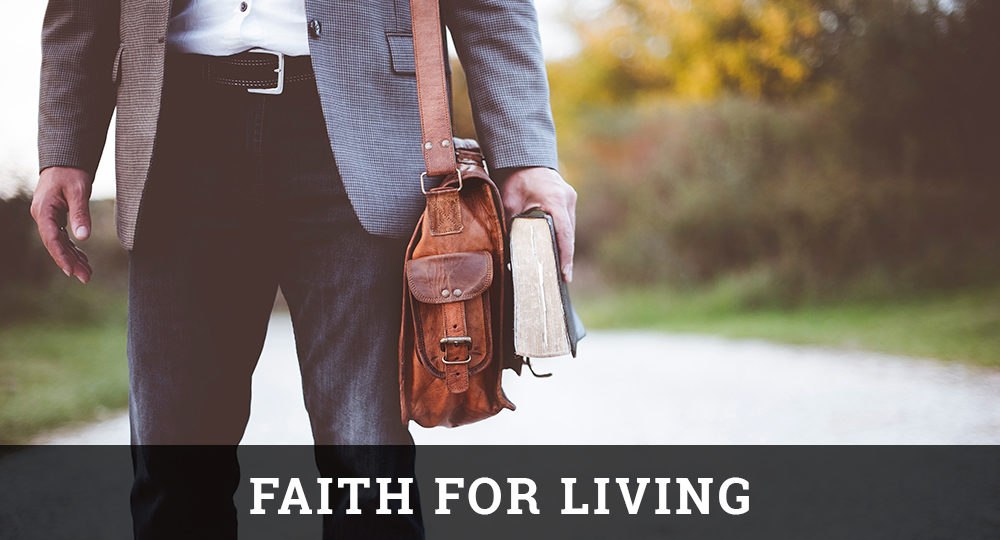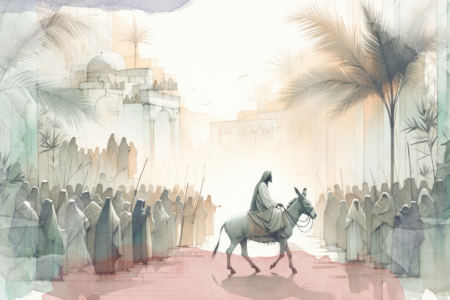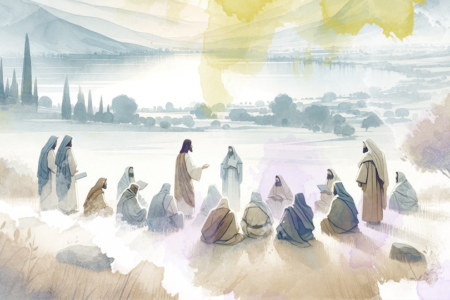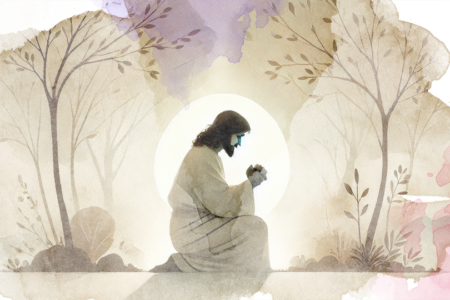Malchus’s Encounter With Jesus
Rising in the morning, Malchus didn’t know his time was near. He had no clue his blood would be shed that evening as he shared an hour with a Man whose blood would also be shed. He had no idea the coming events would be the most significant of the ages.
It had been a turbulent week. Planning to make Jesus king, the Jewish people had triumphantly celebrated His arrival, laying palm branches before Him as He rode humbly into Jerusalem on a donkey. The Pharisees, scribes, and elders—jealous because of Jesus’ miracles and popularity—now despised Him all the more. News had spread that He healed two blind men on His way into town. To make matters worse, after His heralded arrival, He denounced these religious leaders, pronouncing a series of woes on them.
The Pharisees—especially Caiaphas, the high priest whom Malchus served—fumed. They conspired to kill Jesus and used Judas, one of Christ’s own disciples, to betray Him. Jesus’ hour had come. Yet, He performed a final healing miracle to help Malchus, demonstrating yet again His unfathomable love for mankind.
The Encounter
That evening, Malchus arrived in the company of troops whom the chief priests and Pharisees sent to arrest Jesus. Carrying lanterns, torches, and weapons, their vicious hostility ruined the quiet peacefulness of the Garden of Gethsemane. Immediately, Jesus’ disciple Judas approached Him. “Greetings, Rabbi,” he said, and kissed Him. The betrayer had told the Romans, “Whomever I kiss, He is the One; seize Him” (Mt. 26:48). Then soldiers rushed to snatch Him.
Only minutes earlier, Jesus had spent an hour sweating blood in agonizing prayer with His beloved Father. He knew what torture lay ahead, yet He accepted His Father’s will. He was prepared to be the paschal Lamb sent to be slain. His blood could redeem the souls of the world—even those who stood menacingly before Him.
As the soldiers laid hands on Jesus, His disciple Peter drew his sword and sliced off Malchus’s right ear. How ghastly that moment must have been. Even minor cuts to the head bleed profusely. The gaping wound where Malchus’s ear had been severed must have gushed blood everywhere. Imagine how much more Jesus’ head must have bled from the crown of thorns the soldiers later pressed into His skull.
The Healing
In a stunning display of undeserved love, Jesus reached out to Malchus. He knew this enemy suffering before Him belonged to the high priest plotting His death. Yet, He said, “Permit even this” (Lk. 22:51), meaning, “Let Me do one more thing before you take Me.” He placed His loving hand on the wound and healed Malchus. Then, He reprimanded Peter before the mob: “Put your sword in its place” (Mt. 26:52).
Why did Jesus go to the garden that night? He knew His hour to redeem us had come because it was determined before the foundation of the world (1 Pet. 1:18–21). He knew we all were born under a death sentence because of Adam and Eve’s sin in the Garden of Eden (Gen. 3; Rom. 3:23); and He came to free us from that condemnation (Jn. 3:16–17)—a feat that could be accomplished only through His shed blood.
God’s Law requires blood for a soul’s atonement because “the life of the flesh is in the blood” (Lev. 17:11). The New Testament echoes that truth: “Without shedding of blood there is no remission” (Heb. 9:22). Jesus’ love for us is so great He took on human flesh and shed that blood Himself so that we could be forgiven through faith in Him. He became our atoning sacrifice so that we could be set free.
Earlier that week, Jesus said, “I have come as a light into the world, that whoever believes in Me should not abide in darkness” (Jn. 12:46). After healing Malchus, He asked the chief priests, captains of the Temple, and scribes, “Have you come out, as against a robber, with swords and clubs? When I was with you in the temple daily, you did not try to seize Me. But this is your hour, and the power of darkness” (Lk. 22:52–53).
Malchus belonged to the darkness. Now, he stood face to face with the Messiah. Jesus healed Malchus’s bleeding ear while preparing to shed His own blood and die for Malchus’s sin—and ours. For “God demonstrates His own love toward us, in that while we were still sinners, Christ died for us” (Rom. 5:8).
Love, Forgiveness, and Salvation
We stand before Jesus just as needy as Malchus. We need our Savior’s love, forgiveness, and the light of His salvation, for “in Him was life, and the life was the light of men. And the light shines in the darkness, and the darkness did not comprehend it” (Jn. 1:4–5).
Jesus stood in the darkness of the Garden of Gethsemane, shining with the light of everlasting life. He demonstrated at the end of His earthly ministry exactly what He taught in His first recorded sermon: “Let your light so shine before men, that they may see your good works and glorify your Father in heaven. . . . Love your enemies, bless those who curse you, do good to those who hate you, pray for those who spitefully use you and persecute you” (Mt. 5:16, 44). He was not “overcome by evil,” but He overcame “evil with good” (Rom. 12:21).
Jesus responded with active love as He touched and healed Malchus’s ear. Then, hours later, He undeservedly endured judgment, beatings, and crucifixion as the sacrifice for Malchus’s sin (and ours). What a dramatic illustration for us to remember when we confront evil and even petty irritations.
Two of the saddest verses in the Bible are John 1:10–11: “He was in the world, and the world was made through Him, and the world did not know Him. He came to His own, and His own did not receive Him.” Jesus wept in love for His own specially treasured Chosen People even as they rejected Him (Dt. 14:2; Lk. 19:41–44). No wonder Jesus the Messiah is called “a Man of sorrows and acquainted with grief” (Isa. 53:3).
But John 1:12 bursts with hope: “But as many as received Him, to them He gave the right to become children of God, to those who believe in His name.” How can anyone ignore this kind of love? Neither physical descent from Abraham nor obedience to the Law nor good deeds nor church attendance nor growing up in a Christian home makes people righteous. Only genuine faith in Christ can do that.
God’s amazing gift of love and forgiveness is available to everyone of all backgrounds through the Messiah, whom God sent first to His Chosen People and then to the Gentiles. God told Abraham, “In you all the families of the earth shall be blessed” (Gen. 12:3). The apostle Paul later wrote, “The Scripture, foreseeing that God would justify the Gentiles by faith, preached the gospel to Abraham beforehand, saying, ‘In you all the nations shall be blessed.’ . . . that the blessing of Abraham might come upon the Gentiles in Christ Jesus, that we might receive the promise of the Spirit through faith” (Gal. 3:8, 14).
A Glimpse of Christ
We don’t know if Malchus came to faith in Jesus or how his healed ear affected Caiaphas’s household, but his story reveals new levels of our Savior’s compassion. It teaches us to react in all situations with forgiveness and active love. Jesus’ final healing miracle summarized who He was, what He taught, and why He came.
Every day, Jewish people and Gentiles lost in darkness have the opportunity to receive His salvation; and those walking in light have the responsibility to live and respond to others in love and forgiveness. Just like Malchus, we all desperately need Jesus’ loving, healing touch.







